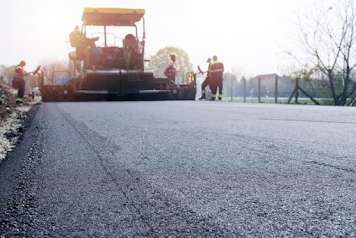Unveiling the Versatility of Road Construction Workers
Introduction:
Road construction is a symphony of coordination and skill,
where every individual plays a crucial role in shaping the infrastructure that
connects communities. In this blog, we delve into the multifaceted world of
road construction workers, exploring the diverse responsibilities and expertise
of supervisors, drivers, laborers, and cleaners. From strategic planning to
hands-on execution, each role contributes to the seamless development of our
road networks.
"The Diverse Roles and Skills of Road Construction Workers"
1. The Visionaries: Road Construction Supervisors
At the helm of every road construction project is a
supervisor, a visionary tasked with overseeing the entire process. Their
responsibilities range from strategic project planning and resource allocation
to ensuring safety regulations are adhered to on the site. Supervisors serve as
the linchpin, connecting different teams and ensuring that the project
progresses smoothly.
Responsibilities of a Road Construction Supervisor:
- Project
planning and coordination
- Resource
allocation and management
- Ensuring
compliance with safety regulations
- Problem-solving and decision-making
- Strategic
Planning: Supervisors are the strategic architects of road
construction projects, developing comprehensive plans to ensure efficient
and successful execution.
- Coordination
and Scheduling: They play a crucial role in coordinating various
tasks, scheduling activities, and managing resources to ensure a smooth
workflow throughout the construction process.
- Problem
Solvers: Supervisors are adept problem-solvers, addressing challenges
that may arise during construction promptly and effectively to prevent
delays or disruptions.
- Quality
Control: Ensuring the highest standards of quality, supervisors
oversee every aspect of construction to guarantee that the project meets
or exceeds industry standards and regulations.
In essence, road construction supervisors are the
visionaries who guide and oversee every facet of a construction project. Their
strategic planning, leadership, and problem-solving skills are essential for
transforming blueprints into robust, functional roadways.
Drivers are the backbone of any construction project,
maneuvering heavy machinery and transporting essential materials to and from
the construction site. From dump trucks to bulldozers, the skillful operation
of these vehicles is essential for the timely and efficient completion of road
construction projects.
Skills and Responsibilities of Road Construction Drivers:
- Proficient
operation of construction vehicles
- Transportation
of materials and equipment
- Adherence
to safety protocols
- Maintenance
of vehicles
3. The Backbone: Laborers Building Foundations
Laborers are the unsung heroes of road construction,
engaging in the physically demanding tasks that lay the groundwork for the
project. From digging trenches to laying asphalt, their hard work forms the
foundation upon which roads are built. Laborers operate various tools and
machinery under the guidance of supervisors, showcasing a diverse skill set.
Tasks Performed by Road Construction Laborers:
·
Excavation and trenching
·
Concrete and asphalt paving
·
Installation of road signs and barriers
·
Manual labor in construction activities
1. Physical Prowess: Laborers are the powerhouse of
road construction, wielding shovels, jackhammers, and other tools that demand
physical strength and endurance.
2. Foundation Laying: They are responsible for
laying the groundwork, digging trenches, and pouring concrete to create the
robust foundations upon which roads are built.
3. Blueprints to Reality: Laborers translate
architectural plans into tangible infrastructure, bringing to life the vision
of engineers and architects.
4.Teamwork: Construction Labour in harmony with other
construction professionals, forming an essential part of the collaborative
effort required for successful project completion.
In essence, laborers are the
backbone of road construction, providing the physical strength and expertise
needed to build the foundations that connect communities.
4. Cleanliness Amidst Chaos: The Role of Road
Construction Cleaners
In the midst of construction chaos, road construction cleaners play a crucial role in maintaining a clean and organized work
environment. Their responsibilities go beyond sweeping and disposing of debris;
they contribute to a safe and efficient workspace, ensuring that the
construction site remains free of hazards.
- Debris
removal and disposal
- Cleaning
and maintaining construction equipment
- Clearing
walkways for safe passage
- Supporting
overall site safety and organization
1.
Transporting Heavy Machinery: Road construction
drivers are responsible for safely transporting heavy machinery and equipment
to and from the construction site. This includes essential vehicles such as
excavators, bulldozers, and paving machines.
2.
Material Delivery: Drivers play a crucial role
in the timely delivery of construction materials, ensuring that everything from
asphalt to concrete reaches the site as per the project schedule.
3.
Precision Maneuvering: Operating large and
powerful vehicles requires precision and skill. Road construction drivers
navigate through challenging terrains and busy construction sites, ensuring the
safe and accurate placement of materials and machinery.
4.
Site Logistics: Drivers contribute to the
overall efficiency of the construction process by strategically positioning
equipment and materials on the site, making them readily accessible for
construction teams.
5. Teamwork Makes the Dream Work: Collaboration among
Road Construction Workers
The success of a road construction project hinges on the
seamless collaboration among supervisors, drivers, laborers, and cleaners.
Effective communication, shared goals, and mutual respect create a synergy that
transforms construction sites into dynamic workspaces. The exchange of
knowledge and expertise ensures that each worker contributes their unique
skills to the collective effort.
Benefits of Team Collaboration in Road Construction:
- Increased efficiency and productivity
- Enhanced safety measures
- Timely project completion
- Improved problem-solving capabilities
- Teamwork among road construction workers is crucial
for achieving efficiency and completing projects on time. When individuals
work collaboratively, tasks are distributed effectively, and each team
member can focus on their specialized area.
- Collaboration fosters better communication among road
construction workers, leading to improved safety measures on construction
sites. Team members can coordinate and share information about potential
hazards, ensuring that everyone is aware of safety protocols.
- Effective teamwork enables the optimal
utilization of resources in road construction projects. By leveraging the
diverse skills and expertise of each team member, tasks can be assigned
based on individual strengths, resulting in a more efficient use of human
resources.
- Teamwork fosters a collaborative environment where road construction workers can pool their ideas and experiences to find innovative solutions to challenges.
Conclusion: Building Roads, Connecting Communities
As we navigate the versatile world of road construction
workers, it becomes evident that each role is indispensable to the success of
the project. Supervisors, drivers, laborers, and cleaners form a cohesive unit,
transforming blueprints into tangible infrastructure. The roads we travel on
daily are not just a result of asphalt and concrete but a testament to the
dedication, skills, and collaboration of these unsung heroes who work
tirelessly to connect communities and pave the way for progress.




Comments
Post a Comment